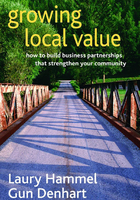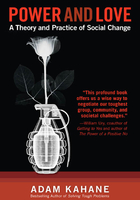3.Why Is Talkin' About Nothin' So Darned Hard?
LET ME COUNT THE WAYS
So far you have learned that:
? Small talk is a light, pleasant, aimless verbal exchange that allows people the time and association to develop a sense of relationship. What is said is less important than the fact that we are actually saying anything to some particular person.
? There is no communication skill more important in the world than small talk.
? You love small talk. Yes, you do, as well you should. It is the music of our voices sounding in friendship.
? Small talk is the best cure for social anxiety. It is the one tool designed to turn scary “others” (Them) into friendly associates (Us).
? Shining the bright flashlight of your benign interest on others is the secret to transforming your self-consciousness into regard and respect for others.
? Your level of motivation and your persistence are the best predictors of your ability to challenge and change your communication habits.
You have also learned that what sounds so easy turns out not to be so. Let me count the ways!
Small talk usually begins with the impulse to congregate and engage in verbal behavior followed by a search for a topic to justify the talking that is already under way. Note that the impulse to chat does not begin with matters of the intellect but with a need for interpersonal connection. Indeed, the need for “belongingness” is right up there after physiological and safety needs in Maslow's hierarchy of needs.
The camaraderie is first, the topics are second.
That is the curious business of small talk.
The communication values honed in intellectual demands, such as public speaking, debate, drama, or negotiation are of only slight pertinence in such social-emotional situations. All language—and especially small talk—is subconscious, habit-driven, and spontaneous. You have to make it up as you go while playing cooperatively with others who are also making it up.
You are literally out of your element:
Treating strangers as if they were friends,
with no reason to talk about anything,
while you are expected to be fluent and engaged, and
dealing with loads of ambiguities, and
a lack of personal experience, and
layers of familial, pedagogical, and cultural training that have estranged you from your primordial communicative ability,
just when you need to consciously increase the trust-making signals that are processed subconsciously.
It takes a lot of energy and intention to turn a scary Them into a trustworthy Us, doesn't it? I know you are much more fluent and secure in discussing something known and familiar to you, with people who are known and familiar to you. But you cannot just jump into a substantive topic of your choice with a stranger, can you? And what makes you think that this new person even wants to talk to you? Answering these questions is the work of small talk.
It's clear that this small talk business
is not small stuff at all.
Your rational mind is trying to deal with an irrational situation on several levels. I don't believe that the complexity of this cognitive challenge is sufficiently recognized and appreciated.
Plus, the following elements further complicate the social conversation: the aegis that sets the tone, your personal background of social exposure, and your social nature.
The aegis sets the expectation of what behavior and conversation are appropriate within its confines. For example, a wedding requires certain behaviors and conversation that differ from a political rally, a football game, or a medical conference. The savvy individual needs to be sensitive to these unspoken expectations and behave accordingly. I once saw a young man who had begun his training at a financial institution go to a party at the home of his manager. The fellow got observably drunk. Not cool. Financial institutions tend to value sober, responsible behavior (at least in public). This fellow appeared to be guided by frat party social conventions.
Then there's your personal background. How many of you are still operating in the world in which you were raised? It is likely that you don't live in the town where you were born; you may not even speak the language of your childhood. You may be living a life undreamed of by your parents. Many of you have propelled yourself into a career world or social community through your own intelligence and efforts (and luck), creating a lot of distance between the world of your past and your current status. Everything that you learned about social communication is now most likely obsolete, inappropriate, and inadequate. And so, inevitably questions arise:
Should I stand when I'm introduced?
Can I eat this with my fingers or do I have to use a fork?
Is it okay to just walk up and introduce myself to someone?
Don't you wait for the woman to stick out her hand to shake hands?
When I meet the company president, is it more polite to make eye contact or to look down and bow my head?
What if my cellphone rings?
We used to have consistent and reliable answers to these sorts of questions. Nowadays, not so much.
Our natural degree of sociability and, especially, how we handle rejection, real or apparent, can also hold us back.
Maybe you're thinking:
I'm an introvert. I really prefer to be alone. It's not that I can't talk to people; I can and do. It's just that I honestly prefer to be by myself. You have no idea how much is going on inside my own skull!
And we don't, of course.
You may meet an unsmiling face and cold shoulder and too quickly read “rejection” when these seemingly negative social indicators may have nothing to do with you. This person may have just realized he can't find his car keys, or that his girlfriend is having way too much fun with another man, and you think it's all about you. Are you getting a little lesson about your ego here? You should.
Perhaps you deal with painful self-consciousness by trying to look as if you were preoccupied or otherwise trying to manage your public impression—you know, just in case anybody is looking at you. For this I prescribe the 18/40/60 rule as formulated by my friend Dr. Dan Amen, a psychiatrist. Brace yourself:
When you're 18, you worry about what everybody is thinking of you; when you're 40, you don't give a darn what anybody thinks of you; when you're 60, you realize nobody's been thinking about you at all.
I can remember a time when I was feeling particularly socially unresponsive myself. I can't remember what was going on in my life, but I do remember there was a gentleman sitting beside me trying to engage me in conversation. I gave him the most minimal of responses. There was nothing about the man that was objectionable; I just didn't want to talk. Toward the end of the evening, this man said to me, “Yes, ma'am, I think you're probably like one of my best friends who's a real quiet feller. A wonderful man, he prefers just to watch people and observe what's going on. He's just not one for a whole lot of chat. He has a lot of depth to him, and you're probably just like that.”
Now that one came out of left field and caught me right between the eyes. I managed to muster some kind of response and thanked him for his kindness, and I've never forgotten the lesson in graciousness he gave me.
Other people really have a lot better things to do than negatively critique you. But self-consciousness will blind you to those other possibilities. It prevents you from accessing your natural sociability and goodwill. I use the image of a flashlight when I talk about being self-conscious: it's like aiming your flashlight straight into your own eyes. It makes you preoccupied with yourself and unable to look out over the glare to focus on others.
Instead, how about aiming that flashlight of your attention at other people? It will take the focus off of you (and your self-consciousness) and onto your talking partner, providing benevolent warmth and opportunities to engage. If that sounds like something you want, that's what this book is about.
Once you've identified the role these three elements play—the aegis, your background, and your inherent sociability—you're in a better position to make them subject to rational attention. Then you can bring forth your consciousness, intelligence, and information gathering to help you deal with them instead of running away. Simply paying attention is a good start. There is so much to be gained by observing other people and their social behavior. This is how all children get started, after all.













